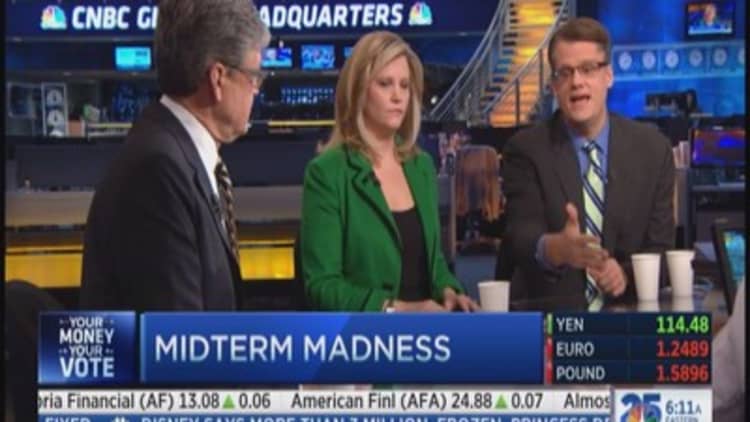After the Republican-controlled Congress sorts out its new hierarchy, and after it gets done battling President Barack Obama over immigration, then will come the time to get some actual work done.
Atop the priority list, at least from a market perspective, will be meaningful tax reform to address some of the thornier issues of concern to corporate America.
With another whiff of change in the air, Wall Street pros are starting to handicap the odds of getting some actual changes in the tax code.
The priorities are to help U.S. companies bring home some of the more than $2 trillion they have parked overseas in an effort to avoid highest-in-the-world corporate tax rates. Doing so would have a two-pronged benefit: Getting some cash that hopefully would be used to grow the economy, and ending the rash of so-called inversions in which companies do deals that allow them to establish domiciles in lower-tax countries.

Hopes are not terribly high for Congress to achieve actual corporate tax reform, and even lower for changes to laws for individuals.
Read MoreUS companies now stashing $2 trillion overseas
Goldman Sachs, for instance, gives a 30 percent probability for some type of deal in 2015.
"If tax reform is to have a fighting chance of becoming law in 2015, work will need to begin soon," Goldman economist Alec Phillips said in a report for clients. "After new Republican chairmen have settled into their roles on the House and Senate tax-writing committees in early 2015, we expect to see draft tax reform proposals dealing with a corporate and individual tax reform."
The three most likely developments, according to the scenario, are a repatriation of profits at much lower tax levels; a change in incentives for investment that would see an increase in rates for equipment and research and corresponding cuts on structures; and a change in preferential tax rates for certain sectors.
"The White House and Republicans agree that revenue gained by limiting corporate tax breaks should be used to lower corporate tax rates, but disagree on how to measure this," Phillips said. "To significantly lower rates, most major tax preferences would need to be curtailed."
Read MoreFirst up for Republicans: Expect this change
That, of course, is where the trouble comes in.
Constituencies that lose their favored tax status rebel, lobby and seek to avoid or at least delay such measures until the next election cycle, when they will try to elect representatives favorable to their priorities.
Still, Congress is likely to try. One proposal would tax future foreign earnings at 1.25 percent, with accumulated overseas earnings on the books taxed at 8.75 percent if held in cash or 3.5 percent if in foreign assets.
Any movement might help at least placate the numerous voices on Wall Street who for years have been calling for changes in the way corporate profits are taxed, with the prime advocacy toward lowering rates and broadening the base of those who pay by reducing loopholes.
"America has one of the highest corporate tax rates in the world. It is the cause of a great deal of tax planning and structural gymnastics, and it is also a contextual barrier to many corporations' ability to repatriate capital to the U.S. or to locate there in the first place," Elliott Management, led by deep-pocketed Republican donor Paul Singer, said in its third-quarter letter to investors.
Read MoreThe secretive money man who helped the GOP win
"For decades, policymakers have believed that they can get away with this disincentive, since the benefits of operating a business in America ... generally exceeded those in other developed countries," the letter continued. "However, as time goes on, the tax regime has become more and more of a negative factor in an increasingly competitive world."
Still, there's a fairly significant level of pessimism that anything substantial gets done considering the level of acrimony between Obama and congressional Republicans that remains high.
After all, the reform drumbeat has been substantial for years, to little avail.
"Corporate tax reform, that might be a bridge too far," said Joseph Quinlan, chief market strategist at U.S. Trust. "A complete overhaul of the U.S. tax system would take two years just to study and to lay out their recommendations."
Quinlan believes tax laws need to be more transparent, in addition to solving the riddle of how to get companies to bring their cash back to U.S. shores.
"Capital goes where it's treated best," he said. "The fact that we have so much cash overseas does tell you that there's something wrong with corporate tax policies. Whether it's double-taxation or a lack of transparency, the fact that corporations are that compelled to hold the cash overseas tells you there's something fundamentally wrong with corporate tax policies."






